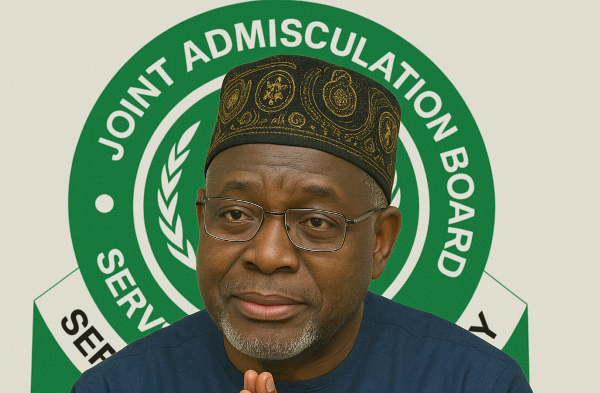JAMB 2025 UTME Debacle: In Tears and Truth, Oloyede Sets Gold Standard in Leadership Integrity

By Nnanke Harry Willie
“The supreme quality for leadership is unquestionable integrity.” – Dwight D. Eisenhower
JAMB has recently been in the news for all the wrong reasons. However, imagine for a moment that it could have been worse. Imagine if it were your typical Nigerian Agency. Imagine if it were the immediate past Independent National Electoral Commission Chairman (INEC), Mahmood Yakubu, also a professor, who had been in charge of JAMB. Of course, he would have looked at the disillusioned candidates, screaming parents, and protesting secondary school administrators directly in their faces and told them through his body language to “Go to Hell”.
He would then have couched his irritation by asking them to “Go to Court!”, a court where he would lead the Commission to stoutly defend their shortcomings as well as do everything to make the complainants look like idiots by refusing to present the necessary materials for them to prove the veracity their complaints of INEC failures and complicity in uploading fake results and truncating the people’s will.
Meanwhile, as the dust swirls around the 2025 UTME fiasco, the Nigerian public has once again taken its familiar stance at the intersection of outrage and judgment. The Joint Admissions and Matriculation Board (JAMB) finds itself under fire for significant technical failures that marred the exam experience and results for nearly 380,000 candidates across Lagos and the South-East. But amidst the calls for blood and blame, one truth stubbornly persists: Professor Ishaq Oloyede has delivered a masterclass in ethical leadership, unprecedented in Nigeria’s public service ecosystem.
Imagine for a moment if the Ministry for Power, INEC or the NNPC attempted to follow the JAMB/Oloyede example. So many truths would be unveiled that should force a reset of magnificent proportions; and significant progress made!
Not All Professors Are Created Equal
Imagine, for a moment, that the immediate past chairman of the Independent National Electoral Commission (INEC), Professor Mahmood Yakubu, had been the one in charge of JAMB. Would we have seen transparency, accountability, or even a hint of remorse?
Unlikely!
From the 2023 general elections, Nigerians learned that Yakubu’s response to allegations of malpractice and technical failures was often laced with institutional arrogance—his standard retort was the cold and dismissive “Go to court.” A line that became a cloak for impunity, especially as his commission persistently stonewalled judicial inquiries by withholding critical electoral materials.
The contrast is stark. Where Yakubu chose opacity, Oloyede chose clarity. Where others might obfuscate, he bared his soul. Oloyede stood in front of cameras and stakeholders, fighting tears, and said:
“I apologise and take full responsibility, not just in words.”
Tech Glitches in other climes
Technical failures in high-stakes, computer-based tests are not unique to Nigeria. In the United Kingdom, the Edexcel and OCR exam boards have had multiple years of digital system meltdowns and scoring errors—affecting GCSE and A-level students. The UK government didn’t sack the Chief Regulators; instead, independent reviews were commissioned, reforms initiated, and accountability strengthened.
In Australia, the 2020 rollout of NAPLAN Online—Australia’s standardised CBT assessment—was so plagued by connectivity problems and data loss that several state education ministers threatened to boycott the test. The chief executives of the test administration bodies weren’t asked to resign. Instead, the Australian Curriculum and Reporting Authority initiated a robust systems audit and fixed the cracks collaboratively with stakeholders.
India also saw chaos during its 2022 NEET CBT exams, with hundreds of thousands of candidates affected by glitches in biometric verification and server crashes. The response? An institutional apology and re-examination—not witch-hunts.
These examples illustrate a crucial point: Technological failure in public assessments is often systemic, not always symptomatic of poor leadership. The real test lies in how a leader responds—and by every global standard, Professor Oloyede passed this test with distinction.
Why Oloyede’s Tears Matter
It is not weakness when a leader sheds tears for a failure that affects the dreams and futures of nearly 400,000 young Nigerians. It is courage, a reflection of emotional intelligence, moral fibre, and accountability. In a country where many top officials double down in defiance or duck responsibility altogether, Oloyede stooped and owned the problem.
The fallout from the failure was significant: 157 centres compromised, 379,997 candidates impacted, and a nationwide credibility challenge for JAMB. But instead of hiding behind bureaucracy, Oloyede invited external stakeholders—including former Aviation Minister, Osita Chidoka, who now runs a very influential NGO, for a comprehensive post-mortem. Chidoka aptly described JAMB’s conduct as:
“A demonstration of integrity and a commendable act of public accountability.”
“Indeed, the contrast with other public agencies is jarring. While many default to defensiveness, JAMB engaged in what should be the gold standard: institutional introspection, stakeholder dialogue, and transparent remediation.”
Commendation Over Condemnation
The Association of African Universities (AAU), in its letter to Oloyede, lauded his decision to accept responsibility as an act of “extraordinary integrity and exemplary public service.” According to the AAU Secretary General, Professor Olusola Oyewole, Oloyede’s empathy and transparency helped “restore confidence in institutional integrity and elevate the standard of public leadership in Nigeria and Africa.”
Such words are not lightly offered by an academic pan-African institution. They underscore a deeper truth: Nigeria desperately needs more Oloyedes, leaders who are both accountable and reform-minded.
The Uncomfortable But Necessary Truth
Let’s be clear: this episode brought significant psychological trauma to thousands of students, their families, and educators. Their pain is real and valid. But had a leader with questionable integrity been in charge, the damage might have been buried under layers of denials, committees, and hollow bureaucratese. Different leaders, different legacies.
Oloyede’s actions reflect what leadership should look like in Nigeria—and anywhere else: not perfection, but transparency, humility, and resolve to right the wrongs. JAMB should also go the extra mile to provide a window to individual students who may wish to review of their performance if they feel shortchanged.
So yes, mistakes were made. But in the grand ledger of public leadership, Oloyede has etched his name on the side of honour.
And for once, that should be enough. Let’s move on. Please.
Nnanke Harry Willie is publisher of BRANDECONOMY. He writes on brand building, leadership, public policy, and corporate accountability. He is also a respected brand management consultant.












